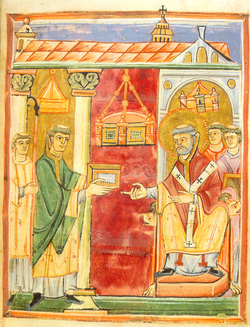
His preaching of heavenly doctrine, confirmed by many miracles and the example of his life, so softened the hearts of the islanders as to draw many of them to the Christian faith, and finally he baptized the king himself, with a great number of his people, to the great joy of his wife, Queen Bertha, who was a Christian. One Christmas day, when he had baptized more than ten thousand in the bed of the river at York, it is related that those who were suffering from any disease received health of body and soul together. He was consecrated bishop by order of Gregory, and fixed his see at Canterbury in the church which he built in honour of the Saviour, where he placed monks to help him in his work. He also built in the suburbs a monastery of St. Peter, which was afterwards called by his own name. The same Pope Gregory granted him the use of the pallium, and the power to organize the ecclesiastical hierarchy in England, sending him a new band of helpers, namely Mellitus, Justus, Paulinus, and Rufinianus.
Having arranged the affairs of his church, Augustine held a synod with the bishops and doctors of the ancient Britons, who had long been at variance with the Roman Church in the celebration of Easter and other rites. But since he could not move them, either by the authority of the apostolic see or by miracles, to put an end to these variations, in a prophetic spirit he foretold their ruin. At length, after having endured many difficulties for Christ, and having become noted for miracles, when he had placed Mellitus in charge of the church of London, Justus of that of Rochester, and Laurence in charge of his own church, he passed to heaven on the 26th day of May, in the reign of Ethelbert, and was buried in the monastery of St. Peter, which thereafter became the burying-place of the bishops of Canterbury and of some kings. The English people honoured his memory with fervent zeal; and the Supreme Pontiff Leo XIII extended his Office and Mass to the universal Church.




